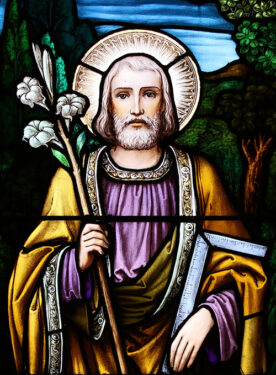My dear brothers and sisters in the Lord,
This year, as we come closer to the Feast of St. Joseph, our Holy Father, Pope Francis, has given us a wonderful meditation on the 150th Anniversary of the Proclamation of St. Joseph as Patron of the Universal Church. In his Apostolic Letter entitled “With a Father’s Heart” (Patris Corde), we see the meditation of Pope Francis on St. Joseph, to whom he has great devotion.

Clearly, Joseph was a beloved father in the service of the whole plan of Salvation. Joseph did sacrificial service to the mystery of the Incarnation. Truly, we call him our spiritual father who, in the midst of the turmoil of the birth of Jesus, was able to be a strong support to Mary and to become, as St. John Paul II called him, “The Guardian of the Redeemer.”
Joseph was a tender, “loving father.” In the history of Salvation, we recognize that power is made perfect in weakness. Joseph was a strong man, but he was able to deal with the issues that surrounded him by living in the background, not taking the first place. Joseph was the support of the Holy Family. How much of a lesson is this today for our fathers who need not take first place in the family but become the strength of wife and children in a special way.
St. Joseph was an “obedient father.” This is hard to understand, but Joseph obeyed God’s will, which he recognized by way of dreams. He first recognized that he should not be afraid to take Mary as his wife. And then, in a dream, Joseph was told to go to Egypt to save the life of the child. And he promptly obeyed and did not follow his own intuition and inclination and will. Rather, Joseph followed the will of God Himself.
Joseph was also an “accepting father.” He accepted his own situation and became a spiritual father, not one who sought an explanation for everything, but rather accepted his special role. God the Father is greater than our small hearts; He knows everything. We are especially mindful of this as we support others, especially in their weakness.
St. Joseph was a “creatively courageous father,” as Pope Francis calls him. Joseph had a certain type of creative courage in the midst of difficulties. He was able to find a way, even when there seemed to be no escape from the issues that surrounded him. Joseph was always there for Mary and Jesus. He taught Jesus the carpenter trade so that He could make a living and support His mother when Joseph passed away. In a certain sense, Joseph was always in the background, yet always creating a stable home for his family.
Joseph was a “working father,” as the Holy Father calls him. He saw labor as part of God’s plan for him. He saw himself as a means of creating the ambiance where Jesus could grow to maturity.
As Pope Francis describes him, Joseph was a “father in the shadows.” Yes, Joseph was almost always behind the scenes in the Holy Family. He was able to understand when the Child Jesus was found in the Temple after He was lost among them for three days. Joseph bore and understood Jesus’ response, “Why were you looking for me? Did you not know that I must be in my Father’s house?” (Luke 2:49) Was Jesus rejecting Joseph as His father? No. Jesus was affirming that Joseph was His father on earth, but His heavenly Father was the one who laid out the plan of life for Jesus.
We, too, must sometimes take a lesser place than we deem acceptable or owed to us. If we look at each aspect of the Holy Father’s Apostolic Letter, we will understand not only Joseph’s life but also how we can improve our own life.
As we put out into the deep of this Lenten Season, we recognize that Lent is about understanding how we do God’s will better in our lives.
All of our sacrifices and good works are aimed at making us more sensitive to understand God’s immediate will for us. We pray and go to St. Joseph, that he might enable us, as he did in his dreams, to understand God’s will for each and every one of us.
Follow Bishop DiMarzio on Twitter @BpDiMarzio
facebook.com/bishopdimarzio
